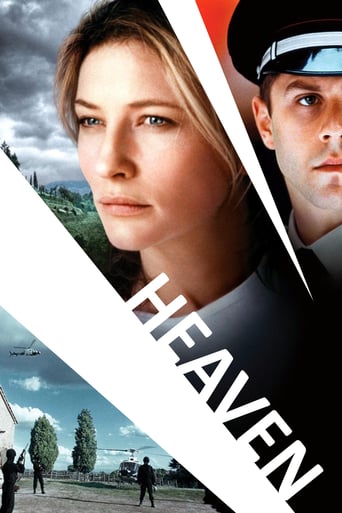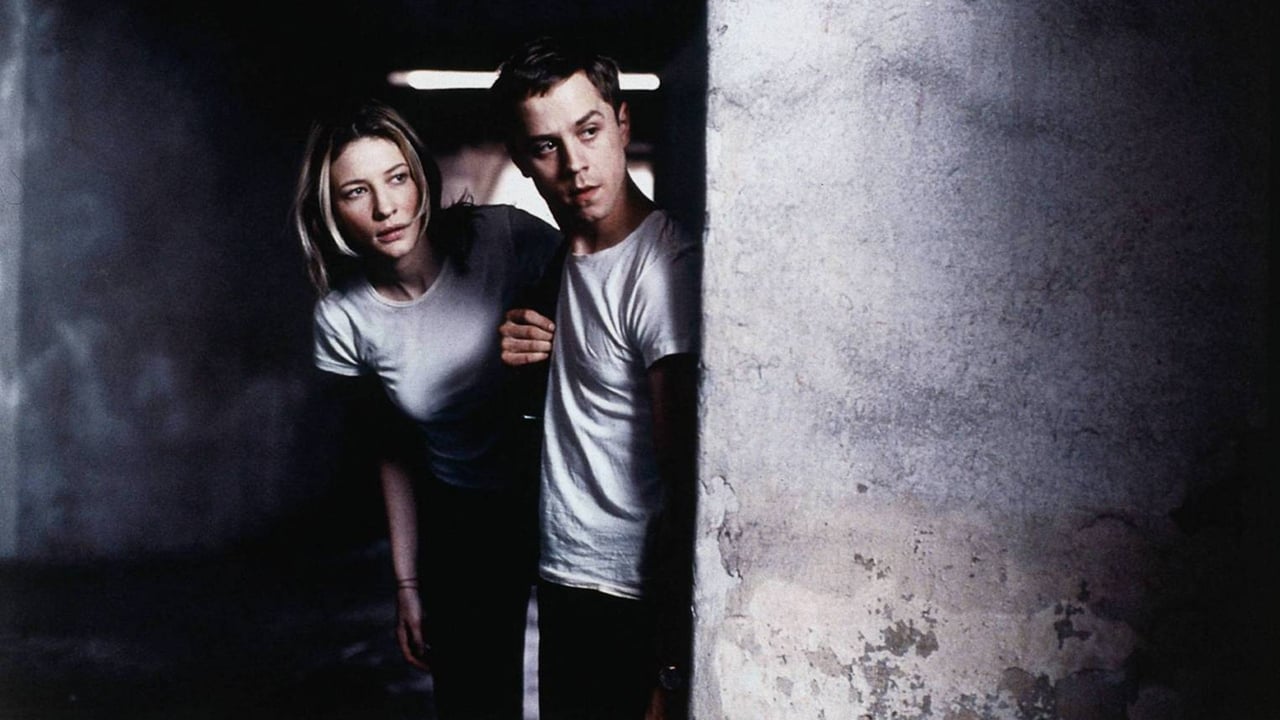Sindre Kaspersen
German screenwriter and director Tom Tykwer's fifth feature film which was written by Polish filmmaker and screenwriter Krzysztof Kieslowski (1941-1996) and Polish screenwriter Krzysztof Piesiewicz, is based on their trilogy "Heaven, Hell and Purgatory". It premiered In competition at the 52nd Berlin International Film Festival in 2002, was screened in the Special Presentations section at the 27th Toronto International Film Festival in 2002, was shot on locations in Italy, England and Germany and is a USA-Germany co-production which was produced by producers Stefan Arndt, Frédérique Dumas, Maria Köpf, Anthony Minghella and William Rorberg. It tells the story about a schoolteacher named Philippa Paccard who is arrested after having placed a bomb in an office building in Turin, Italy. During interrogation, she learns that four innocent people were killed in the bombing and that she is believed to be a member of a terrorist organization.Subtly and precisely directed by German filmmaker Tom Tykwer, this finely tuned fictional tale which is narrated from the two main characters viewpoints, draws an eloquent portrayal of a young Italian policeman who falls in love and begins sympathizing with an imprisoned English woman. While notable for it's naturalistic milieu depictions, sterling production design by production designer Uli Hanisch, cinematography by German cinematographer Frank Griebe and use of music, this character-driven and noir-like drama depicts two charming studies of character.This modestly romantic, atmospheric and at times humorous thriller which is set in the city of Torino and in the medieval renaissance hill town of Montepulciano in Italy, is impelled and reinforced by it's cogent narrative structure, endearing characters and the likewise acting performances by American actor Giovanni Ribisi and Australian actress Cate Blanchett. A quiet, imaginative and graceful love-story from the early 2000s.
George Wright
Heaven is a chilling movie, full of suspense, that takes the viewer into the world of two young people on the run. It begins with a powerful dramatic punch that sets the course and tone of the rest of the movie. I must admit to liking subtitles, since I have hearing loss but I also find the Italian dialogue gives realism to the location. Cate Blanchett and Giovanni Ribisi are the unlikely couple, who find themselves fleeing the authorities. Ribisi plays an extraordinary role with total credibility, devising clever strategies to foil the police. Blanchett is a powerful presence who keeps the audience riveted to the screen, particularly in the opening scenes. The acting is superb by the supporting cast as well as the leading actors. The cinematography is excellent, and spans scenes of narrow streets, villages, barns and warehouses as well as the open countryside. I didn't find the movie slow and brooding, as some suggest. On the contrary, it seems to move quickly without flagging. There are some tender moments that are very moving. The ending is subdued but the overall impact makes it well worth viewing.
starrywisdom
What a piece of pretentious claptrap. This is why I really, really hate European movies: they all seem to think breathless non-dialogue and ridiculous premises and big over-dramatic ambiguous endings are, you know, Art. More like Crap. Cate Blanchett was wasted and the other actors were just painful to watch. Not to mention the fact that the premise of this utter boresome snooze made no sense whatsoever. So, her husband was dead, there were drugs pushed by the big bad, she made an oopsie that killed four people, there are these Big Significant Connections between the two protagonists...what a crock. Doesn't require a suspension of disbelief but more like a total abdication of common sense. I really hope Blanchett didn't actually cut her hair for this, because it was a vain sacrifice if she did. There's a couple hours of my life I won't get back. Oh, and the half English half Italian dialogue trick was just plain tiresome. Do yourself a favor: go read a book instead. It gets a 3 for the gorgeous scenery and architecture. That's it.
Ilpo Hirvonen
The work of Krzysztof Kieslowski can be simplistically categorized into three sections: the first division is genre-based, short and full-length documentaries from 1966-1988, the second consists of fiction features made in Poland and the third is his international production - The Double Life of Veronique (1991) and The Three Colours Trilogy (1993-1994). In 1985 Kieslowski made his first film with the screenwriter Krzysztof Piesiewicz - (No End), with whom he made all of his subsequent films. After Three Colours: Red (1994) Kieslowski announced that he would leave the film industry and live in peace. Only two years after in 1996 he passed away on the operating table. But his story wasn't over yet; Kieslowski together with Piesiewicz had started working on a new film cycle: Heaven, Hell and Purgatory, the screenplay of Heaven was the only one which was completely finished but it is obvious that the two men had talked about each film.It was quite a courageous choice from Tom Tykwer to start working on a screenplay written by two perhaps the greatest European filmmakers ever. But I can't think of anyone who would've fit the job better, mainly because of the similar elements in his films with Kieslowski's: Both Tykwer's Die tödliche Maria (1993) and Kieslowski's Krótki film o milosci (1988) portray two people who live in two opposite buildings and whose relationships are limited by a narrow border. Also in Kieslowski's Amator (1979) a man pathologically films his habitat with a movie camera - finds the fascination of creation and the joy of witnessing events; just as in Tykwer's Winterschläfer (1997) only with a photo camera. Both of their lives are dramatically changed due to photography or cinematography. Last but not least: both Kieslowski's Przypadek (1981) and Tykwer's Lola rennt (1998) deal with postmodern philosophy, the concept of reality and the relation of reason and consequence.The beginning of Kieslowski's international production meant a change in the position of woman in his films. His female characters sort of 'rose from kitchen'. This meant the increase of new emotional scales. Heaven also has a female main character, and quite a courageous one: A woman sets a bomb in a room of a businessman, who sells drugs for children. A series of events occurs that a cleaning woman takes the bomb to an elevator, where four people are killed. The woman is ready to confess her crime but then hears that she has failed in her mission and ended up killing four innocent people.The film is divided into two parts: the first part ends when Philippa - the woman has finally succeed in killing the business man and the second is a mystery act. To my mind this is a very good film, but it might seem really weird for those unfamiliar with the work of Kieslowski. Because of its multiple references but also because of its unique narrative and thematics. A leading theme in The Three Colours is the paradox of love and freedom: one cannot be free in love and the people who think they're free are the least free of all. Both freedom (Blue) and equality (White) are illusions to Kieslowski, whose real natures can only be exposed by love - and fraternity (Red) is the purest manifestation of it. Heaven kind of continues this and dealing with the force of love, which is the strongest force of all.Krzysztof Kieslowski was an atheist, but he had had a catholic upbringing, which can clearly be seen in his work: he often dealt with sin, regret and forgiveness. In the film cycle The Decalogue (1989) about The Ten Commandments, he builds a picture of a modern man facing moral dilemmas. In Heaven the woman takes justice to her own hands and commits a crime - a sin. Later on when she has realized that she killed four innocent people, she decided to try again, succeeds and sins again. Dostoyevskyan battle between good and evil has also been a big influence in the work of Kieslowski and many other European artists. In Heaven Tykwer also clearly portrays the good ones and the evil ones, and the battle between them.Many common elements from Kieslowski's later work can be found in Heaven as well: open ending, elements that exceed realism and giving a new chance for the main character. Even that love was a very strong element in the films by Kieslowski and in Heaven; the world-view of it is Kieslowskian pessimistic: the rulers, the authorities don't end up in court even that they transport drugs for children. The open ending is very absurd, multidimensional and almost reaches fantasy as did Kieslowski's ethereal Blue (1993).What is Heaven? Is it a paradise and does paradise equal freedom? Do the main characters only seek for the illusion of freedom, are they just searching for something that isn't there? Does heaven await for them and are they forgiven? It's left opened and Tykwer doesn't offer any answers, neither do I or anyone, we only have a big book of questions and a lifetime ahead. I think Tykwer succeed very well in making a tribute to Kieslowski, who seems to be able of breathing into us beyond the grave. He is a true master, my cinematic hero whom I will never forget. The insightful themes of sin, forgiveness and justice, for which the woman loses her faith in, are dealt with love which is the strongest force of all and the purest of all emotions.



 AD
AD





